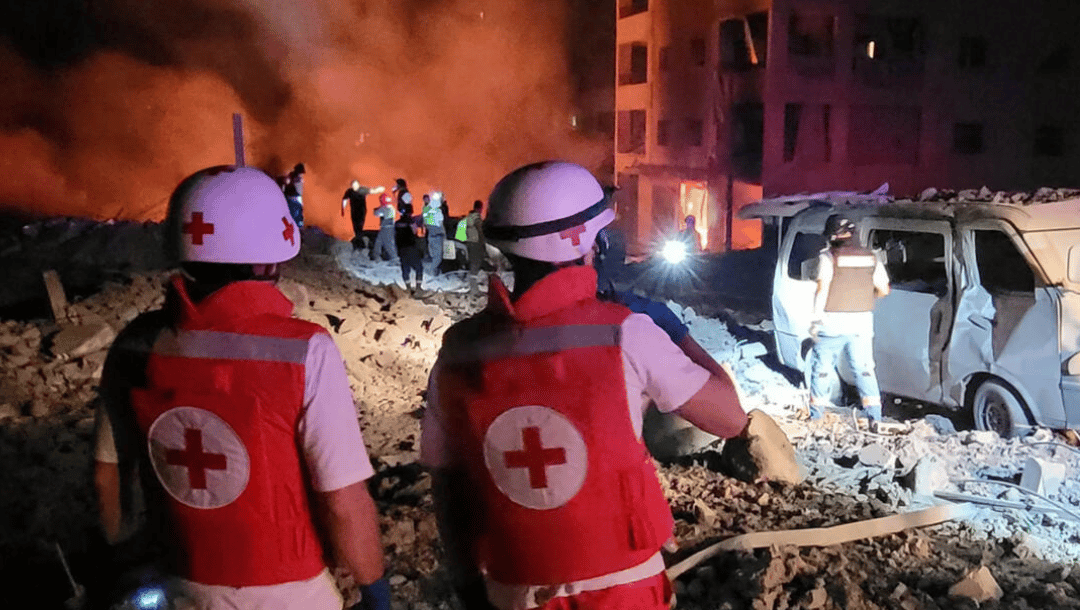Strategizing from 7 cities across the globe
The Silent Battle for Healthcare Amidst Conflict
Lebanon’s hospitals, once bustling with care and community, now stand as silent battlegrounds. During the past years of escalated conflicts, attacks on healthcare facilities in southern Lebanon have robbed thousands of essential medical care.
TRAUMAWARMIDDLE EASTHEALTHCARE
Raya Hage
11/13/20244 min read


In Lebanon, war does not only destroy buildings and roads—it quietly, yet violently, pulls apart the heart of communities: the healthcare system. When thinking of war, we can only envision the blasts, the shrapnel, the smoke coming out of the crumbled walls. Yet, hidden from view are the many lives lost not to bullets, but to the collapse of healthcare. Each missile that hits a hospital, each checkpoint that blocks the delivery of medicine, leaves another family praying for a loved one to survive what could have been a treatable illness.
Life and Loss in Lebanon's Hospitals
Lebanon’s hospitals, once bustling with care and community, now stand as silent battlegrounds. During the past years of escalated conflicts, attacks on healthcare facilities in southern Lebanon have robbed thousands of essential medical care. Imagine a mother, holding her sick child, with no nearby hospital to turn to. This is not a nightmare in Lebanon, but a reality. Clinics are closed, hospitals overwhelmed, and medical supplies limited as a result of direct attacks and resource shortages.
In these fragile and vulnerable regions, doctors have a front row seat to tragedy daily. Nurses and doctors remain at their posts, even as their hospitals face threats from airstrikes. They move quietly from bed to bed, helping children and elderly, knowing that their hospital could be next. Yet, they stay because they know that without them, there may be no one left to care at all.
Fragility of Health Amid Economic Ruin
Lebanon's economic collapse, or disaster if we can say so, has intensified this crisis, leaving some of the hospitals without even the most basic essentials. Since the Lebanese Pound started its free fall, the cost of medical supplies has reached an unmanageable level. Families are left paying prices unimaginable just a few years ago, before the 2019 crisis. In Beirut, where the scars of the 2020 port explosion remain raw, parents line up at pharmacies, desperate to find baby formula, antibiotics, even bandages. They count their money again and again, hoping it is enough, only to learn that even the smallest necessities are out of reach.
These economic hardships are not isolated – they spread. Doctors and nurses, who have remained in Lebanon out of dedication to their patients and fellow citizens, are burned out, underpaid, and in many cases, unpaid. They carry the weight of loss and heartbreak on their shoulders, unable to offer hope because they too are struggling to survive. The exodus of skilled health workers (nurses, surgeons, therapists..) drains Lebanon of the professionals needed to care for those who remain. As they leave, the heart of healthcare in Lebanon weakens, leaving patients more feeble than ever.
The Wounds We Cannot See
Beyond the physical pain, Lebanon suffers from the unseen wounds of war—the trauma that holds survivors long after the storms have quieted. Children play among rubble, but their laughter hides their anxiety, as their lives have been shaped by the unstable rhythm of conflict. Lebanese psychologists have observed rising rates of anxiety and PTSD, particularly after the Beirut Port explosion, a tragedy that reawakened the traumas of older generations who endured Lebanon's civil war. Parents are themselves, burdened by memories of war, and they find themselves at a loss, unable to help their children living in this world of fear.
In Lebanon’s shelters and temporary homes, entire families sleep side by side, their dreams interrupted by the sounds of nearby explosions or the silent fear of the unknown. This life leaves scars that can be felt even in future generations. It is a wound that is maybe unseen, but is painful.
Hope in the Heart of Darkness
Despite the daily hardships, the Lebanese people continue to fight for the right to survive, to heal, and to hope. Local NGOs and international humanitarian groups provide lifelines, bringing food, supplies, and a sense of solidarity. Young volunteers work from sunrise to sunset to fill the gaps left by governmental failures, finding ways to deliver essentials to those who need them most.
This resilience shines brightest in Lebanon’s healthcare workers, who continue to stand tall, even as the world falls around them. These men and women, often risking their own lives, embody the heartbeat of Lebanon. They may not wear a cape, but they are the true heroes, preserving health and dignity against the odds.
Conclusion : A Call for Global Solidarity
Lebanon’s story is a call to the global community. A reminder that healthcare is a human right, even in times of war. To watch a nation’s lifeline slowly disappear is to witness a deep injustice. It is our responsibility to not only rebuild, but to create a healthcare system that protects the most vulnerable, supports healthcare workers, and gives back dignity to those living in conflict zones.
Lebanon’s healthcare crisis is more than a headline; it is a series of personal battles fought daily, often quietly, by us, Lebanese people who have no choice but to carry on. It is a testament to the resilience of a people who refuse to let their lives be defined by war alone. And it is a reminder that, in the face of difficulty, the spirit to heal and to hope endures.
References:
1. Frontiers in Public Health. (2020). A Generation at Risk: The Impacts of Lebanon's Escalating Humanitarian Crisis on Children. Frontiers in Public Health (https://www.frontiersin.org)
2. World Health Organization. (2024). Attacks on Hospitals and Health Workers Jeopardize Provision of Health in Lebanon. WHO News (https://www.who.int)
